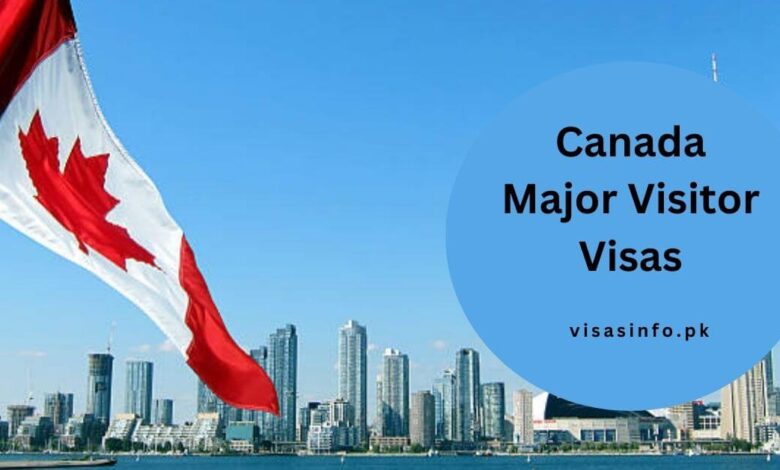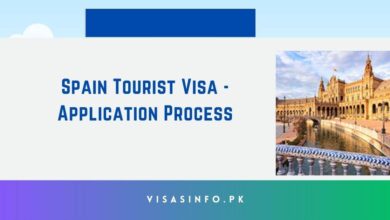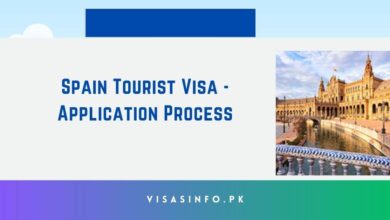Canada Major Visitor Visas 2024 – Apply now

This article will address Canada’s significant advancements in the areas of open work permits and guest visas. We are well-versed in the most recent modifications to these Visa categories. This update is indispensable regardless of whether you are contemplating a trip to Canada or reviewing available work permit positions.
Join us as we analyze the evolution of Visa processing timelines and trends, providing you with essential guidance and insights.
Please be advised that these updates are derived from our meticulous analysis of processing times and patterns, rather than any official statements from ministers or popular news on social media.
Processing Times for Canadian Visas (Study permits, Tourist visas & Open work permits)
The processing timeframes apply to all of these Visa categories as of October 2023, the date of this article’s composition. The processing times have been extended, particularly for Indian applicants who are applying for visas.
Previously, the processing of visa applications, which encompassed the time necessary for biometric checks, took a total of 10 days. However, there has been a recent and significant shift in the processing of applications, which are now being completed within 20 to 25 days. Additionally, the process of stamping a visa has been extended from 10 days to 15 to 20 days, as opposed to the previous expedited process.
The primary cause of this alteration in processing timeframes is the substantial number of diplomats who visited India, which increased the burden on the visa processing system. The system is being strained and the delays we are experiencing are the consequence of an application backlog that has been created by the stationing of forty diplomats in India.
As a result of the increased burden, applicant wait times have increased, which has had an impact on processing times. Although there are a few exceptional instances in which petitioners have succeeded in obtaining their visas in less than seven to eight days, these are the exception rather than the rule. At present, the majority of applications are processed within a 20- to 25-day timeframe.
It is crucial to recognize that these delays are not solely due to an increase in the number of applications. For instance, delays are exacerbated by verification procedures. Verification is frequently contracted to external businesses, which may increase processing delays. The positive aspect of these revisions is that the Visa trend is still on the rise.
Check Also: Canada Visa Application Centers to Open in 10 Indian Cities
Visa Pattern
A discernible shift has occurred in favor of candidates’ favorable outcomes. Visas are issued to applicants who may not satisfy all of the criteria, but they are subject to specific limitations. In conclusion, the overall trajectory is positive, even though processing times have increased. Furthermore, the processing timelines, which are currently 20 to 25 days, are reasonable, particularly in comparison to previous delays.
The recent interactions between the prime ministers of the United Kingdom, Canada, and other nations have prompted some discussions; however, the specifics of these discussions have not been disclosed.
Although there have been a few modifications to the processing time since the previous update, Visa trends are generally improving. Applying for a Canadian visa at this time may be the optimal course of action. It is important to bear in mind that processing periods of 20 to 25 days are reasonable, given the delays observed during the peak of the COVID-19 pandemic.
It is important to remember that the application procedure necessitates patience, and you can still accomplish your objectives of studying or working in Canada.
Total Cost of Canada Work Permit 2024
What is the cost of a work permit in Canada? The cost of obtaining a work visa in Canada is a frequently asked question. The cost of a work permit can be complex because it is contingent upon a variety of factors, such as the form of work permit you require and your circumstances.
This section aims to elucidate the issue and guide you through the process.
Canada Work Permit
It is essential to emphasize that a labor market impact assessment (LMIA) and a work visa for Canada are not available for purchase or sale. No, direct payment is not suitable for this situation. Work permits are not granted in Canada on the basis of money exchanges; rather, they are granted based on merit and eligibility.
Your eligibility for a work permit is primarily determined by your language proficiency (French or English), professional experience, job-specific skills, and degree of education. In other words, the emphasis should be placed on your qualifications rather than the quantity of money you can contribute.
Regrettably, certain employers may impose fees for their services in securing work permits for international employees. These fees are not only illegal and inhumane, but they also frequently contravene Canadian immigration laws and regulations. When seeking employment, it is imperative to comprehend these hazards. The country of Canada
Before the COVID-19 pandemic, certain organizations required payment from foreign employees to obtain work permits. This conduct was more prevalent in the past. Nevertheless, the epidemic has resulted in several modifications that have exacerbated the situation for both international workers and enterprises.
Since COVID-19, the Canadian government has endeavored to tighten regulations regarding work permits and international laborers. Consequently, the number of employers engaging in this illegal activity has decreased. The economic crisis and labor market disruptions have resulted in an increasingly competitive business environment.
Many employers are hesitant to charge foreign workers fees for work permits because they are already experiencing difficulty recruiting. When making this decision, it is essential to recognize that paying an employer for a work permit is not a morally or legally permissible practice in Canada. You must exercise caution and make an informed decision.
Benefits of Canada Major Visitor Visas
- Diverse Experiences: Canada is renowned for its vibrant communities, cultural diversity, and breathtaking natural landscapes. A visitor visa enables travelers to investigate numerous attractions, including multicultural festivals, historical sites, and national parks.
- Family Reunification: The visitor visa enables individuals to visit family members or acquaintances in Canada, thereby fostering personal relationships and facilitating family reunification.
- Business Opportunities: The visitor visa enables business travelers to network and investigate potential business partnerships by facilitating meetings, conferences, and trade shows.
- Flexible Short-Term Stays: Visitor visas typically permit stays of up to six months, providing visitors with ample time to enjoy their trip without the long-term commitment of other visa categories.
- Simple Application Process: The application process for a visitor visa is relatively simple, particularly for individuals who satisfy the eligibility requirements. Applicants are frequently able to submit their applications online, which is a practical option.
- Multiple Entry Options: Canada provides multiple-entry visitor visas, which enable travelers to enter and depart the country multiple times during the visa’s validity period.
- Investigate Immigration Pathways: While on a visitor visa, individuals have the opportunity to investigate potential immigration options for the future, such as work or study permits.
- Visa Validity: Certain visitor visas may be valid for a period of up to ten years, which enables the execution of extended travel plans without the necessity for frequent reapplication.
- Tourist Activities and Attractions: Visitors have the opportunity to engage in a diverse array of activities, including skiing in the Rockies, attending cultural events, and visiting world-renowned institutions.
- Health Care Accessibility: Visitors are not eligible for public health care; however, they are granted access to private health care services while in Canada.
- Cultural Exchange: Visitors have the opportunity to directly experience the culture, traditions, and lifestyle of Canada, thereby fostering cultural understanding and exchange.
- Study Eligibility: Visitors may be permitted to enroll in seminars or courses during their visit, contingent upon their circumstances and the duration of their stay.
Legitimate Pathways to Work in Canada
In addition to employing study permits, there are legal methods of employment in Canada. Obtaining a study permit may be a more prudent and cost-effective option if you are contemplating a visit to Canada. In certain circumstances, obtaining a study permit will enable you to work a part-time job while studying in Canada.
Additionally, if you satisfy the prerequisites, you may convert from a study permit to permanent residency through the provincial nominee program or express entry system (PNP).
In summary, it is crucial to recognize that charging for work permits is illegal and unethical, even though some companies may continue to do so. Examine legal alternatives, such as study visas and PR programs, which offer a more ethical and secure method of residing and working in Canada, rather than employing questionable methods to secure employment.
Always seek guidance from licensed immigration consultants or attorneys to ensure that you are following the correct and legal immigration procedures.
Frequently Asked Questions:
-
What are the different types of visitor visas for Canada?
The visitor visa is officially called a temporary resident visa. There are 2 types of visas: single-entry visa and multiple-entry visa.
-
Can I get a 10-year visitor visa in Canada?
While valid, a multiple entry visa will let you travel to Canada for six months at a time as many times as you want. It will be valid for up to 10 years or one month before your passport expires, whichever is shorter.
-
Is Canada giving a visitor visa now?
Most travelers need a visitor visa to travel to Canada. You may also need one if you’re transiting through a Canadian airport on your way to your final destination. A visitor visa (also called a temporary resident visa) is an official document that we put in your passport.



